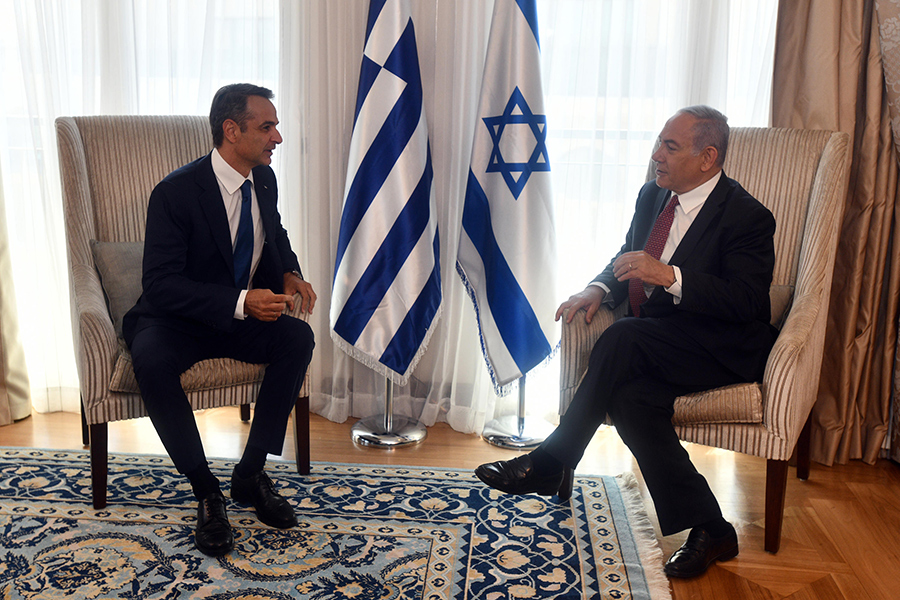Benjamin Netanyahu’s victory in the November 2022 Israeli legislative election brought the architect of the Israeli-Greek friendship back to power. As prime minister in 2010, Netanyahu was the first to advocate for this friendship. He subsequently initiated a process that is demonstrating a high degree of resilience despite changing geopolitical conditions and political developments.
Since 2010, Greek governments of various political ideologies, from center right to center left to left, have valued Israel as a crucial partner and envisaged closer ties with the Jewish state. For its part, the Bennett-Lapid government, though short-lived, also worked to move the bilateral partnership forward in 2021 and 2022.
Greece could be pivotal in maintaining positive momentum in relations between Israel and the European Union. Dendias’s Jerusalem visit took place only a few days after Israeli President Isaac Herzog met with President of the European Commission Ursula von der Leyen in Brussels. The importance of Israel for Europe is rising in view of the war in Ukraine. In its attempt to reduce its energy dependency on Russia, the European Union signed a memorandum of understanding with Israel (and Egypt) in June 2022 to secure stable imports of natural gas. Israeli-European conversations are multifaceted and cover themes as wide-ranging as trade, agriculture, research and development, tourism, the fight against anti-Semitism, education programs and more.
With that said, Israel-E.U. relations are sometimes marked by disagreement. Jerusalem tends to differ from Brussels on, for example, the way Iran’s moves should be interpreted. In an article published in Politico, President Herzog welcomed the vote in the European Parliament to blacklist Iran’s Islamic Revolutionary Guards Corps (IRGC) as a terrorist organization and commended von der Leyen for backing these calls.
In the bilateral sphere, Israeli-Greek economic relations are flourishing. According to the Israeli Bureau of Statistics, Israeli exports to Greece climbed from $442.6 million in 2019 to $670.3 million in 2022, while imports from Greece increased from $321.2 million in 2019 to $587 million in 2022. Investment opportunities are also rising. Israel is a top investor in Greek tourism and real estate. At the end of January, Tikkun Europe, a subsidiary of the Israel-based Tikkun Olam, inaugurated a medicinal cannabis processing plant in the Greek region of Corinth.
Defense collaboration is also progressing. Defense ministers hold regular meetings, the most recent of which took place in Jerusalem in November 2022. Arms deals are also on the agenda. Ιn the summer of 2022, Forbes reported that Greece had deployed Israeli systems to counter Turkish drones. The country is also reportedly interested in buying Israeli SPIKE/NLOS missiles.
In strategic parlance, as long as Greece is striving to revise its national security doctrine, it can learn valuable lessons from Israel, principally in the fields of cybersecurity, hybrid threats and space. Cooperation also goes well beyond defense. In the summer of 2022, Athens and Jerusalem signed a memorandum of understanding to work together on civil protection.
The current phase of bilateral relations finds Israel having restored diplomatic ties with Turkey. Although trust between Jerusalem and Ankara has yet to be fully regained, this new reality has generated concern in Greece. Athens will need to carefully study the security needs of Jerusalem and chart an autonomous course in their dynamic partnership.
In a recent interview with the Greek newspaper To Vima, Israeli Ambassador to Greece Noam Katz made reference to the maritime agreement between Israel and Lebanon and its potential impact on other arrangements in the Eastern Mediterranean. It will certainly be in the interests of Greece to examine this accord in detail and explore its practical implementation, if any.
Timing is crucial. Greece is looking to settle its maritime differences with Turkey while responding to threats from its neighbor and safeguarding its security. The Israeli experience could be edifying.
Dr. George N. Tzogopoulos is a BESA contributor, a lecturer at the European Institute of Nice (CIFE) and at the Democritus University of Thrace and a Senior Fellow at the Hellenic Foundation for European and Foreign Policy.
Originally published by the Begin-Sadat Center for Strategic Studies.


























